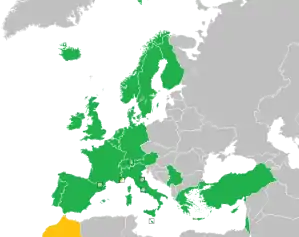Eurovision Song Contest 1992
The Eurovision Song Contest 1992 was the 37th edition of the annual Eurovision Song Contest. It took place in Malmö, Sweden, following the country's victory at the 1991 contest with the song "Fångad av en stormvind" by Carola. Organised by the European Broadcasting Union (EBU) and host broadcaster Sveriges Television (SVT), the contest was held at the Malmö Isstadion on Saturday 9 May 1992 and was hosted by Swedish journalists Lydia Capolicchio and Harald Treutiger.
| Eurovision Song Contest 1992 | |
|---|---|
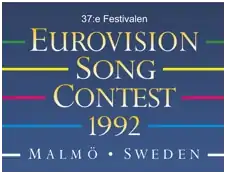 | |
| Dates | |
| Final | 9 May 1992 |
| Host | |
| Venue | Malmö Isstadion Malmö, Sweden |
| Presenter(s) | Lydia Capolicchio Harald Treutiger |
| Musical director | Anders Berglund |
| Directed by | Kåge Gimtell |
| Executive supervisor | Frank Naef |
| Host broadcaster | Sveriges Television (SVT) |
| Opening act | Carola performing "All the Reasons to Live" |
| Interval act | A Century of Dance |
| Website | eurovision |
| Participants | |
| Number of entries | 23 |
| Debuting countries | None |
| Returning countries | |
| Non-returning countries | None |
Participation map
| |
| Vote | |
| Voting system | Each country awarded 12, 10, 8-1 point(s) to their 10 favourite songs |
| Nul points in final | None |
| Winning song | "Why Me?" |
Twenty-three countries took part in the contest with the Netherlands returning after being absent the year before. This set another record for the most participating countries in the history of the competition, which would be broken again the following year. The 1992 contest also saw the last participation of the Federal Republic of Yugoslavia, as they were banned from competing only a few weeks later due to the Yugoslav Wars.
The winner was Ireland with the song "Why Me?" by Linda Martin. The song was written by Johnny Logan, who had won the 1980 contest as singer and the 1987 contest as singer/songwriter. At 41 years of age, Linda Martin became (and remains) the oldest woman ever to win Eurovision.[1]
Location
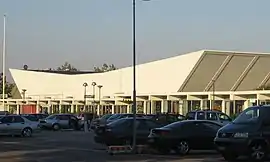
Malmö is the capital and largest city of the Swedish county of Scania. The metropolis is a gamma world city (as listed by the GaWC) and is the third-largest city in Sweden, after Stockholm and Gothenburg, and the sixth-largest city in Scandinavia, with a population of above 300,000.[2]
Malmö Isstadion, a 4,800-seat indoor sports arena, was chosen as the host venue for the contest. Opened in 1968, it is the former home arena of the Malmö Redhawks ice hockey team, and underwent major renovation in 2013 in time for the 2014 World Junior Ice Hockey Championships.
Contest overview
The contest took place at Malmö Isstadion, where the stage set was in the shape of a Viking ship's bow with a dragon in the centre and stars on each side. The opening sequence included women dressed in the Swedish colours of yellow and blue, twirling ribbons. The filmic postcard tradition was continued with clips based on each country. Last year's winner, Carola, appeared on stage in a white dress with sheer sleeves, a rhinestone collar and cuffs and sang “All The Reasons To Live”.
The 1992 Eurovision was the biggest contest at that time, with 23 countries competing. Only Monaco and Morocco failed to compete out of all the countries which had entered the contest in the past.
This contest marked the last participation of Yugoslavia, although it was not the same country that had participated from 1961 to 1991, but actually, Serbia and Montenegro, formally known as the "Federal Republic of Yugoslavia". That was the country's last entry until 2004, as it was banned from the contest following the sanctions on the United Nations Security Council Resolution 757, following the Bosnian War and Croatian War of Independence.
After scoring second place consecutively (1988, 1989) and scoring some disappointing results (1990, 1991), the United Kingdom sent Michael Ball with a contemporary pop song "One Step Out Of Time", which was the hot favourite to win the contest. The British delegation was greeted in Malmö with a banner reading "Welcome Untied Kingdom".[3]
However, the Irish sent Linda Martin, who had the past experience of coming in 2nd place in the 1984 contest and as then paired up once again with Johnny Logan, who had won the contest twice before as a performer. In the end, Linda the contest won for Ireland with a 16-point lead over the United Kingdom, starting the chain of Irish wins in the 1990s. Malta with "Little Child", performed by Mary Spiteri, also scored very well coming in 3rd place with 123 points. This was the first time that the three highest-placed songs had all been in English. Sweden, the host country, finished 2nd last.
Switzerland had to replace its original choice of entry, "Soleil, soleil" which was to have been performed by Géraldine Olivier. The song did not comply with some of the rules of the national selection contest and so, despite having won, it did not go to Malmö.
The top three songs were all performed in English which led to some delegations complaining that English-speaking countries had an unfair advantage.
Participating countries
Conductors
Each performance had a conductor who led the orchestra.[4][5] Musical Director Anders Berglund both conducted the entries for Sweden and Yugoslavia and played the accordion parts for the latter.
 Spain – Javier Losada
Spain – Javier Losada.svg.png.webp) Belgium – Frank Fievez
Belgium – Frank Fievez Israel – Kobi Oshrat
Israel – Kobi Oshrat Turkey – Aydın Özarı
Turkey – Aydın Özarı Greece – Haris Andreadis
Greece – Haris Andreadis France – Magdi Vasco Noverraz
France – Magdi Vasco Noverraz Sweden – Anders Berglund
Sweden – Anders Berglund Portugal – Carlos Alberto Moniz
Portugal – Carlos Alberto Moniz.svg.png.webp) Cyprus – George Theofanous
Cyprus – George Theofanous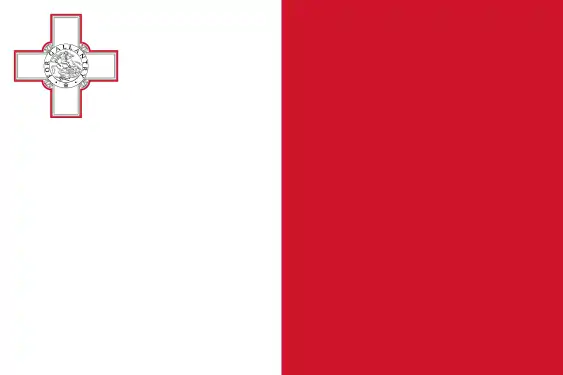 Malta – Paul Abela
Malta – Paul Abela Iceland – Nigel Wright
Iceland – Nigel Wright Finland – Olli Ahvenlahti
Finland – Olli Ahvenlahti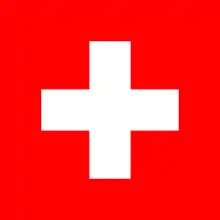 Switzerland – Roby Seidel
Switzerland – Roby Seidel Luxembourg – Christian Jacob
Luxembourg – Christian Jacob Austria – Leon Ives
Austria – Leon Ives United Kingdom – Ronnie Hazlehurst
United Kingdom – Ronnie Hazlehurst Ireland – Noel Kelehan
Ireland – Noel Kelehan Denmark – Henrik Krogsgaard
Denmark – Henrik Krogsgaard Italy – Marco Falagiani
Italy – Marco Falagiani.svg.png.webp) Yugoslavia – Anders Berglund
Yugoslavia – Anders Berglund Norway – Rolf Løvland
Norway – Rolf Løvland Germany – Norbert Daum
Germany – Norbert Daum Netherlands – Harry van Hoof
Netherlands – Harry van Hoof
Returning artists
| Artist | Country | Previous year(s) |
|---|---|---|
| Wind | 1985, 1987 | |
| Sigríður Beinteinsdóttir (part of Heart 2 Heart) | 1990 (part of Stjórnin) | |
| Linda Martin | 1984 | |
| Mia Martini | 1977 | |
| Evridiki | 1983 (backing singer for Stavros & Constantina), 1987 (Backing Vocals for Alexia) |
Results
| Draw | Country | Artist | Song | Language[6][7] | Place[8] | Points |
|---|---|---|---|---|---|---|
| 01 | Serafín | "Todo esto es la música" | Spanish | 14 | 37 | |
| 02 | Morgane | "Nous, on veut des violons" | French | 20 | 11 | |
| 03 | Dafna | "Ze Rak Sport" (זה רק ספורט) | Hebrew | 6 | 85 | |
| 04 | Aylin Vatankoş | "Yaz Bitti" | Turkish | 19 | 17 | |
| 05 | Cleopatra | "Olou tou kosmou i Elpida" (Όλου του κόσμου η Ελπίδα) | Greek | 5 | 94 | |
| 06 | Kali | "Monté la riviè" | French, Antillean Creole | 8 | 73 | |
| 07 | Christer Björkman | "I morgon är en annan dag" | Swedish | 22 | 9 | |
| 08 | Dina | "Amor d'água fresca" | Portuguese | 17 | 26 | |
| 09 | Evridiki | "Teriazoume" (Ταιριάζουμε) | Greek | 11 | 57 | |
| 10 | Mary Spiteri | "Little Child" | English | 3 | 123 | |
| 11 | Heart 2 Heart | "Nei eða já" | Icelandic | 7 | 80 | |
| 12 | Pave | "Yamma, yamma" | Finnish | 23 | 4 | |
| 13 | Daisy Auvray | "Mister Music Man" | French | 15 | 32 | |
| 14 | Marion Welter and Kontinent | "Sou fräi" | Luxembourgish | 21 | 10 | |
| 15 | Tony Wegas | "Zusammen geh'n" | German | 10 | 63 | |
| 16 | Michael Ball | "One Step Out of Time" | English | 2 | 139 | |
| 17 | Linda Martin | "Why Me?" | English | 1 | 155 | |
| 18 | Lotte Nilsson and Kenny Lübcke | "Alt det som ingen ser" | Danish | 12 | 47 | |
| 19 | Mia Martini | "Rapsodia" | Italian | 4 | 111 | |
| 20 | Extra Nena | "Ljubim te pesmama" (Љубим те песмама) | Serbian | 13 | 44 | |
| 21 | Merethe Trøan | "Visjoner" | Norwegian | 18 | 23 | |
| 22 | Wind | "Träume sind für alle da" | German | 16 | 27 | |
| 23 | Humphrey Campbell | "Wijs me de weg" | Dutch | 9 | 67 |
Scoreboard
Each country had a jury who awarded 12, 10, 8, 7, 6, 5, 4, 3, 2, 1 point(s) for their top ten songs.
| Spain | 37 | 1 | 1 | 4 | 6 | 2 | 3 | 3 | 2 | 1 | 1 | 7 | 5 | 1 | ||||||||||
|---|---|---|---|---|---|---|---|---|---|---|---|---|---|---|---|---|---|---|---|---|---|---|---|---|
| Belgium | 11 | 3 | 4 | 3 | 1 | |||||||||||||||||||
| Israel | 85 | 10 | 2 | 8 | 4 | 7 | 4 | 7 | 4 | 8 | 1 | 7 | 2 | 12 | 2 | 4 | 3 | |||||||
| Turkey | 17 | 8 | 3 | 6 | ||||||||||||||||||||
| Greece | 94 | 7 | 8 | 7 | 3 | 5 | 12 | 2 | 5 | 10 | 4 | 12 | 7 | 8 | 4 | |||||||||
| France | 73 | 6 | 12 | 3 | 3 | 7 | 12 | 5 | 6 | 10 | 3 | 6 | ||||||||||||
| Sweden | 9 | 1 | 4 | 4 | ||||||||||||||||||||
| Portugal | 26 | 8 | 2 | 2 | 1 | 5 | 8 | |||||||||||||||||
| Cyprus | 57 | 3 | 10 | 2 | 2 | 1 | 8 | 2 | 6 | 4 | 8 | 3 | 8 | |||||||||||
| Malta | 123 | 12 | 10 | 7 | 12 | 12 | 1 | 8 | 5 | 12 | 8 | 10 | 8 | 3 | 10 | 5 | ||||||||
| Iceland | 80 | 8 | 4 | 4 | 6 | 6 | 6 | 3 | 5 | 7 | 12 | 5 | 5 | 1 | 6 | 2 | ||||||||
| Finland | 4 | 1 | 3 | |||||||||||||||||||||
| Switzerland | 32 | 5 | 12 | 4 | 1 | 10 | ||||||||||||||||||
| Luxembourg | 10 | 10 | ||||||||||||||||||||||
| Austria | 63 | 2 | 8 | 8 | 1 | 3 | 8 | 4 | 10 | 12 | 7 | |||||||||||||
| United Kingdom | 139 | 5 | 12 | 2 | 10 | 10 | 5 | 6 | 6 | 4 | 6 | 8 | 7 | 12 | 7 | 12 | 8 | 12 | 7 | |||||
| Ireland | 155 | 1 | 7 | 12 | 12 | 10 | 4 | 5 | 12 | 7 | 10 | 6 | 10 | 10 | 8 | 10 | 2 | 2 | 7 | 10 | 10 | |||
| Denmark | 47 | 4 | 6 | 7 | 1 | 6 | 6 | 3 | 3 | 6 | 5 | |||||||||||||
| Italy | 111 | 5 | 3 | 12 | 8 | 8 | 10 | 5 | 10 | 12 | 7 | 6 | 12 | 1 | 12 | |||||||||
| Yugoslavia | 44 | 10 | 6 | 1 | 5 | 2 | 3 | 5 | 4 | 2 | 4 | 2 | ||||||||||||
| Norway | 23 | 3 | 2 | 1 | 1 | 4 | 5 | 6 | 1 | |||||||||||||||
| Germany | 27 | 6 | 10 | 6 | 2 | 3 | ||||||||||||||||||
| Netherlands | 67 | 7 | 2 | 5 | 7 | 5 | 4 | 7 | 3 | 1 | 5 | 2 | 8 | 4 | 7 | |||||||||
12 points
Below is a summary of all 12 points in the final:
| N. | Contestant | Nation(s) giving 12 points |
|---|---|---|
| 4 | ||
| 3 | ||
| 2 | ||
| 1 | ||
Spokespersons
Each country announced their votes in the order of performance. The following is a list of spokespersons who announced the votes for their respective country.
 Spain – María Ángeles Balañac[11]
Spain – María Ángeles Balañac[11].svg.png.webp) Belgium – Jacques Olivier
Belgium – Jacques Olivier Israel – Daniel Pe'er[12] (Co-presenter of the 1979 contest)
Israel – Daniel Pe'er[12] (Co-presenter of the 1979 contest) Turkey – Korhan Abay (Co-presenter of the 2004 contest)
Turkey – Korhan Abay (Co-presenter of the 2004 contest) Greece – Fotini Giannoulatou[13]
Greece – Fotini Giannoulatou[13] France – Olivier Minne (Co-presenter of the 2021 junior contest)
France – Olivier Minne (Co-presenter of the 2021 junior contest) Sweden – Jan Jingryd[14]
Sweden – Jan Jingryd[14] Portugal – Ana Zanatti[15]
Portugal – Ana Zanatti[15].svg.png.webp) Cyprus – Anna Partelidou[16]
Cyprus – Anna Partelidou[16] Malta – Anna Bonanno
Malta – Anna Bonanno Iceland – Guðrún Skúladóttir
Iceland – Guðrún Skúladóttir Finland – Solveig Herlin[17]
Finland – Solveig Herlin[17] Switzerland – Michel Stocker[18]
Switzerland – Michel Stocker[18] Luxembourg – TBC
Luxembourg – TBC Austria – Andy Lee
Austria – Andy Lee United Kingdom – Colin Berry[5]
United Kingdom – Colin Berry[5] Ireland – Eileen Dunne
Ireland – Eileen Dunne Denmark – Bent Henius
Denmark – Bent Henius Italy – Nicoletta Orsomando
Italy – Nicoletta Orsomando.svg.png.webp) Yugoslavia – Veselin Mrđen
Yugoslavia – Veselin Mrđen Norway – Sverre Christophersen[19]
Norway – Sverre Christophersen[19] Germany – Carmen Nebel
Germany – Carmen Nebel Netherlands – Herman Slager
Netherlands – Herman Slager
Broadcasts
National broadcasters were able to send a commentary team to the contest, in order to provide coverage of the contest in their own native language.
| Country | Broadcaster(s) | Commentator(s) | Ref(s) |
|---|---|---|---|
| FS1 | Ernst Grissemann | [20] | |
| Hitradio Ö3 | Martin Blumenau | ||
| RTBF1 | French: Claude Delacroix | [21] | |
| BRTN TV1 | Dutch: André Vermeulen | [22] | |
| RTBF La Première | French: Stéphane Dupont and Patrick Duhamel | ||
| BRTN Radio 2 | Dutch: Julien Put | ||
| RIK 1 | Evi Papamichail | [16] | |
| RIK Deftero | Pavlos Pavlou | ||
| DR TV | Jørgen de Mylius | [23] | |
| DR P3 | Jørgen de Mylius, Jesper Bæhrenz and Andrew Jensen | ||
| YLE TV1 | Erkki Pohjanheimo and Kati Bergman | [24] | |
| Radiomafia | Sanna Kojo | ||
| Antenne 2 | Thierry Beccaro | [21] | |
| France Inter | Marc-Olivier Fogiel | ||
| Erstes Deutsches Fernsehen | Jan Hofer | [25] | |
| Deutschlandfunk/WDR 4 | Horst Senker | ||
| ET1 | Dafni Bokota | [26] | |
| ERA 1 | Giorgos Mitropoulos | ||
| Sjónvarpið | Árni Snævarr | [27] | |
| RTÉ 1 | Pat Kenny | ||
| RTÉ Radio 1 | Larry Gogan | ||
| Israeli Television | No commentator | ||
| Reshet Gimel | Yitzhak Shim'oni | ||
| Rai Due | Peppi Franzelin | [28] | |
| Rai Radio 2 | Antonio De Robertis | ||
| RTL Hei Elei | Maurice Molitor | ||
| TVM | Anna Bonanno | ||
| Nederland 3 | Willem van Beusekom | [29] | |
| Radio 2 | Daniël Dekker | ||
| NRK | John Andreassen | [30] | |
| NRK P1 | Nadia Hasnaoui | ||
| RTP Canal 1 | Eládio Clímaco | [15] | |
| La 2 | José Luis Uribarri | [31] | |
| TV2 | Jesper Aspegren and Björn Kjellman | [14] | |
| SR P3 | Kalle Oldby and Lotta Engberg | ||
| TV DRS | German: Mariano Tschuor | ||
| TSR | French: Ivan Frésard | [32] | |
| TSI | Italian: Emanuela Gaggini | ||
| TV1 | Bülend Özveren | ||
| TRT Radyo 3 | Canan Kumbasar | ||
| BBC1 | Terry Wogan | [5] | |
| BBC Radio 2 | Ken Bruce | [5] | |
| TVB 1 | Mladen Popović | ||
| Radio Belgrade 1 | Dina Čolić |
| Country | Broadcaster(s) | Commentator(s) | Ref(s) |
|---|---|---|---|
| SBS TV | Unknown | [5] | |
| MTV1 | István Vágó | ||
| MTV 1 | Jon Ilija Apelgrin | ||
| TVNZ | Unknown | [5] | |
| TVP1 | Artur Orzech and Maria Szabłowska | ||
| RTR | Unknown | [33] | |
| KBS | Unknown | [5] | |
| SLO1 | Miša Molk | [34] |
References
- O'Connor, John Kennedy. The Eurovision Song Contest - The Official Celebration. Carlton Books, 2015. ISBN 978-1-78097-638-9. Pages 32-33
- Statistics Sweden. "Landareal per tätort, folkmängd och invånare per kvadratkilometer. Vart femte år 1960 – 2015" [Land area per urban area, population and per square kilometer. Every five years, 1960 – 2015]. Statistics Sweden. Archived from the original on 12 June 2018. Retrieved 28 January 2017.
- "Malmö 1992".
- "And the conductor is..." Retrieved 10 September 2020.
- Roxburgh, Gordon (2020). Songs For Europe - The United Kingdom at the Eurovision Song Contest. Volume Four: The 1990s. UK: Telos Publishing. pp. 96–110. ISBN 978-1-84583-163-9.
- "Eurovision Song Contest 1992". The Diggiloo Thrush. Retrieved 5 March 2012.
- "Eurovision Song Contest 1992". 4Lyrics.eu. Retrieved 16 September 2020.
- "Final of Malmö 1992". European Broadcasting Union. Archived from the original on 18 April 2021. Retrieved 18 April 2021.
- "Results of the Final of Malmö 1992". European Broadcasting Union. Archived from the original on 18 April 2021. Retrieved 18 April 2021.
- "Eurovision Song Contest 1992 – Scoreboard". European Broadcasting Union. Archived from the original on 24 September 2015. Retrieved 24 October 2021.
- "María Ángeles Balañac". Imdb.es. 1 May 2009. Archived from the original on 12 March 2012. Retrieved 10 August 2012.
- "פורום אירוויזיון". Sf.tapuz.co.il. 13 September 1999. Archived from the original on 8 October 2011. Retrieved 10 August 2012.
- "Εκφωνητές της ΕΡΤ για τις ψήφους της Ελλάδας στην EUROVISION - Page 3". Retromaniax.gr. Archived from the original on 11 September 2012. Retrieved 10 August 2012.
- "Infosajten.com". Infosajten.com. Archived from the original on 18 July 2012. Retrieved 10 August 2012.
- "Comentadores Do ESC - escportugalforum.pt.vu | o forum eurovisivo português". 21595.activeboard.com. Archived from the original on 21 April 2012. Retrieved 10 August 2012.
- Savvidis, Christos (OGAE Cyprus)
- "Selostajat ja taustalaulajat läpi vuosien? • Viisukuppila". Viisukuppila.fi. Retrieved 10 August 2012.
- Baumann, Peter Ramón (OGAE Switzerland)
- Dyrseth, Seppo (OGAE Norway)
- Archived 24 October 2007 at the Wayback Machine
- Christian Masson. "1992 - Malmo". Songcontest.free.fr. Retrieved 10 August 2012.
- "Hasselt 2005: Jarige André Vermeulen verzorgt commentaar met Ilse Van Hoecke –". Eurosong.be. 25 October 2005. Retrieved 10 August 2012.
- "Forside". esconnet.dk. Archived from the original on 24 March 2012. Retrieved 10 August 2012.
- "Selostajat ja taustalaulajat läpi vuosien? • Viisukuppila". Viisukuppila.fi. Retrieved 10 August 2012.
- "Eurovision Song Contest 1992". Ecgermany.de. Retrieved 10 August 2012.
- "Η Δάφνη Μπόκοτα και η EUROVISION (1987-2004)". Retromaniax.gr. Archived from the original on 12 September 2012. Retrieved 10 August 2012.
- "Morgunblaðið, 08.05.1992". Timarit.is. Retrieved 10 August 2012.
- Archived at Ghostarchive and the Wayback Machine: "Mia Martini Rapsodia Eurofestival 1992". YouTube. Retrieved 10 August 2012.
- "Welkom op de site van Eurovision Artists". Eurovisionartists.nl. Retrieved 10 August 2012.
- "Hvem kommenterte før Jostein Pedersen? - Debattforum". Nrk.no. Archived from the original on 2 November 2012. Retrieved 10 August 2012.
- "FORO FESTIVAL DE EUROVISIÓN • Ver Tema - Uribarri comentarista Eurovision 2010". Eurosongcontest.phpbb3.es. Archived from the original on 17 March 2012. Retrieved 10 August 2012.
- "Biographie Ivan Frésard". Fresard.ch. Retrieved 10 August 2012.
- "Телепрограмма на 09-05-1992". tvp.netcollect.ru. Retrieved 27 January 2018.
- Klub OGAE Slovenija (OGAE Slovenia)
External links
| Wikimedia Commons has media related to Eurovision Song Contest 1992. |
